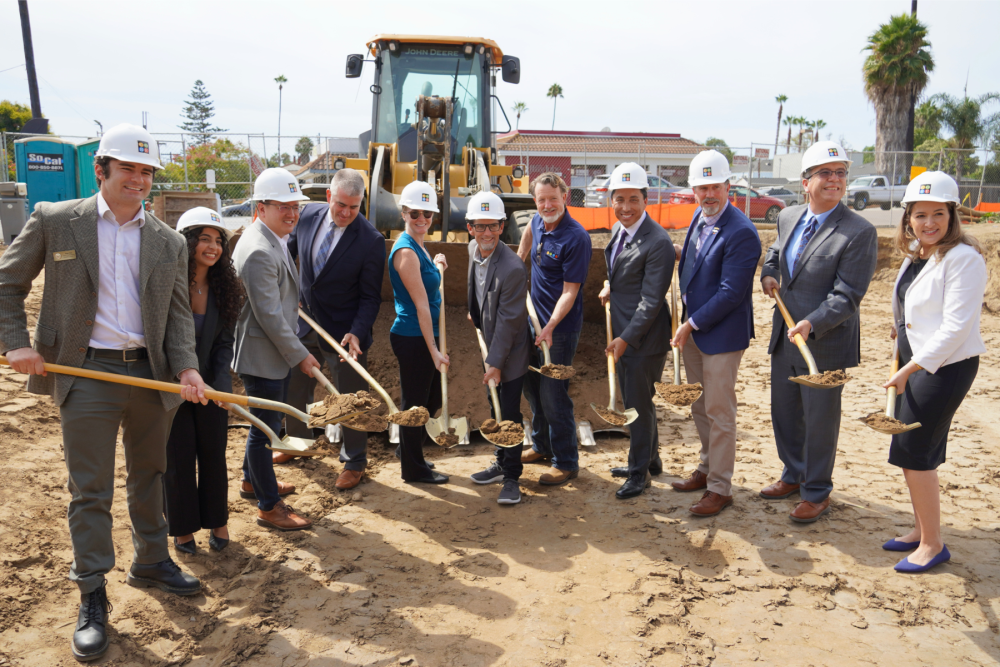City Breaks Ground on Rose Creek Village: New Affordable Housing Project with Units Reserved for Veterans

The City of San Diego officially broke ground today on Rose Creek Village, a new affordable housing community that will provide 59 high-quality studio apartments, including 18 units reserved for veterans. Set to open in 2026, this innovative project in the Pacific Beach neighborhood will connect residents to the vibrant culture and services that make this area one of the most desirable in the city.
The project, in partnership with the National CORE and the San Diego Community Housing Corporation (SDCHC), represents a significant step forward in addressing the city’s need for affordable housing in high-resource neighborhoods.
Rose Creek Village will offer modern, energy-efficient studio apartments tailored to individuals, small families, veterans, and seniors. The apartments will be available to residents earning between 30% and 60% of the area median income, with a focus on providing long-term housing stability through comprehensive resident services. This project is part of the city’s ongoing efforts to ensure every San Diegan has access to safe, stable, and affordable housing.
"Rose Creek Village is a perfect example of what happens when we work together to build affordable housing in every part of our city,” said Mayor Todd Gloria. “Thanks to our commitment to the Bridge to Home program, we’re bringing housing solutions to neighborhoods like Pacific Beach, where many residents may not otherwise have access to affordable homes. Housing is the foundation of stability, and this project will help change lives by providing a safe, stable place for San Diegans to call home."
The development is aligned with the city’s broader goals of addressing homelessness and creating balanced housing opportunities across all communities. According to the 2025 Point-in-Time Count, over 9,900 individuals experienced homelessness in San Diego County, a 6.5% decrease from the previous year. Rose Creek Village will help make significant strides toward reducing that number by providing permanent, supportive housing for those who need it most, including 18 veterans who have experienced homelessness.
Rose Creek Village will feature a variety of amenities aimed at fostering community and enhancing the well-being of residents. These include a community room, bike hub, laundry facilities, and a barbecue area. Transit accessibility is also a key consideration, as many low-income residents rely on public transportation to get to work and access essential services. The development’s sustainable design features energy-efficient apartments and façade-based solar panels to reduce water and energy usage.
The city’s involvement in this project is a crucial part of its ongoing commitment to addressing the housing crisis in San Diego. Funding for Rose Creek Village comes from a combination of sources, including JP Morgan Chase, SDHC, the San Diego County No Place Like Home program, and the California Department of Housing and Community Development’s Infill Infrastructure Grant. Additionally, SDHC’s support includes federal HOME Investment Partnership Program funds, administered by the City of San Diego.
"Rose Creek Village represents a meaningful partnership between the city, county, state, and private sector," said Lisa Jones, President & CEO of the San Diego Housing Commission. "Together, we are providing much-needed affordable housing for low-income residents, including veterans who have experienced homelessness. This project exemplifies the power of collaboration in creating lasting housing solutions."
To further support residents, the Hope through Housing Foundation will offer on-site services designed to help individuals and families maintain their housing and access the resources they need to thrive. Through partnerships with the County of San Diego Behavioral Health Services, the U.S. Department of Veterans Affairs, and other community-based organizations, residents will receive comprehensive care and support services, ensuring long-term housing stability and overall well-being.
